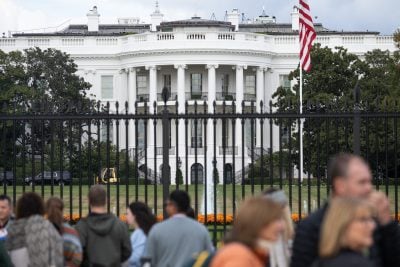By the time you board your plane in Lagos airport, you’re exhausted. Not because of long lines at check-in and security, these are par for the course. But because of the seemingly never-ending requests for money from officials, or those posing as officials.
I’ve loved Nigeria ever since I first travelled there when I was 19. And Nigerians are the most fiercely entrepreneurial people I’ve ever met – which is reflected in the diaspora remittance figures and the success of Nigerian tech start-ups.
Given the record of Nigerian authorities failing to pay public servants on time, one cannot blame airport officials for finding resourceful ways to supplement their salaries. But from personal experience it leaves Nigerians and visitors drained, and negatively impacts Nigeria’s ranking on the ease of doing business indexes.
It also erodes trust in government officials and the very institutions of the state. It is this constant, low-level corruption, which might be helping to stir something in the country.
A few weeks ago, when travelling back after hosting a ‘crisis communications’ seminar for business leaders, and having been asked for $250 dollars by an immigration official so I could borrow his pen, I was experiencing what Nigerians face constantly.
By the time we got to our boarding gate, patience was at a low ebb. So, when an official told us he needed to weigh our hand luggage to check they weren’t overweight, or else we’d need to pay a fine, things began to boil over.
I watched on as fellow travellers, thinking this was yet another scam, began to mutiny. Voices were raised: ‘This is what’s holding our country back’; ‘You and people like you are the problem’; ‘This corruption is why Nigeria is going backwards’; ‘Other countries aren’t like this’. Then came something that didn’t surprise me given what I’d been hearing all week: ‘This won’t happen anymore when Obi wins’.
Throughout my brief stay in Lagos and Abuja, I spoke to many politicians, journalists and other members of the country’s elite.

They told me that it was likely Peter Obi’s hype is only online. That he can’t win. That vote buying will be what determines the outcome of the 2023 Presidential Elections – as it always has done. This was not what I heard when I spoke to working-class Nigerians.
As a political junkie who’s run national election campaigns in the UK and advised politicians across Africa, I asked every driver, waiter, barman and security guard if they were going to vote in 2023, and if so, if they’d decided who they’d be supporting. I was genuinely staggered that, with no exaggeration, every single person said that they were definitely going to vote for Obi. Why? I would ask. Their responses included a mixture of: ‘because he’s young. ‘Because he’s not corrupt’. Because he offers change’.
Obi’s platform
The change Obi promises includes a ‘zero tolerance’ for corruption if he’s elected, through watertight regulations, auditing and vetting practices, proper tendering processes and a policy of joint signatories to prevent embezzlement within government. Obi frames this national anti-corruption drive as the patriotic duty of all Nigerians. And it’s reflected in the mantra of his supporters, who can often be heard repeating the phrase ‘No shishi’ – meaning their support for him has not been bought.
Stopping corruption is also key to Obi’s economic plans. Blocking government ‘leakages’, along with unlocking the potential of human capital in the country are just some of the ways Obi hopes to move the country from ‘consumption to production’ and to deliver sustainable and inclusive economic growth.
Of course, drawing conclusions from these conversations isn’t in any way scientific. The people I spoke to are not a representative sample. I was in Abuja and Lagos, which are their own unique political environments. And from my own personal experience of running campaigns for an insurgent ‘third party’ in the UK, (Change UK) the Obi campaign will come under increasing scrutiny and attacks from the opponents of change which could well knock them off course.
But for me, the contrast between the views of the elites and normal Nigerians was interesting. The support for Obi is also reflected in a recent Bloomberg poll, and I saw it for myself when Obi hosted an event with the diaspora held in North London a few months ago. Taken together, perhaps it suggests that something is happening in Nigeria.
Normal people, tired of the corruption, and the constant sense of crisis (such as the recent devastating floods), might believe that a new Nigeria is possible. That their vote could make a difference this time. That change is possible if they vote for it. Until then, I’ll make sure to bring my own pen when travelling through Lagos airport.
Harry Burns is a political consultant and Vice President at Crestview Strategy. He’s advised politicians and business leaders in the UK and across Africa on communications and election campaigns.
Want to continue reading? Subscribe today.
You've read all your free articles for this month! Subscribe now to enjoy full access to our content.
Digital Monthly
£8.00 / month
Receive full unlimited access to our articles, opinions, podcasts and more.
Digital Yearly
£70.00 / year
Our best value offer - save £26 and gain access to all of our digital content for an entire year!
 Sign in with Google
Sign in with Google 



